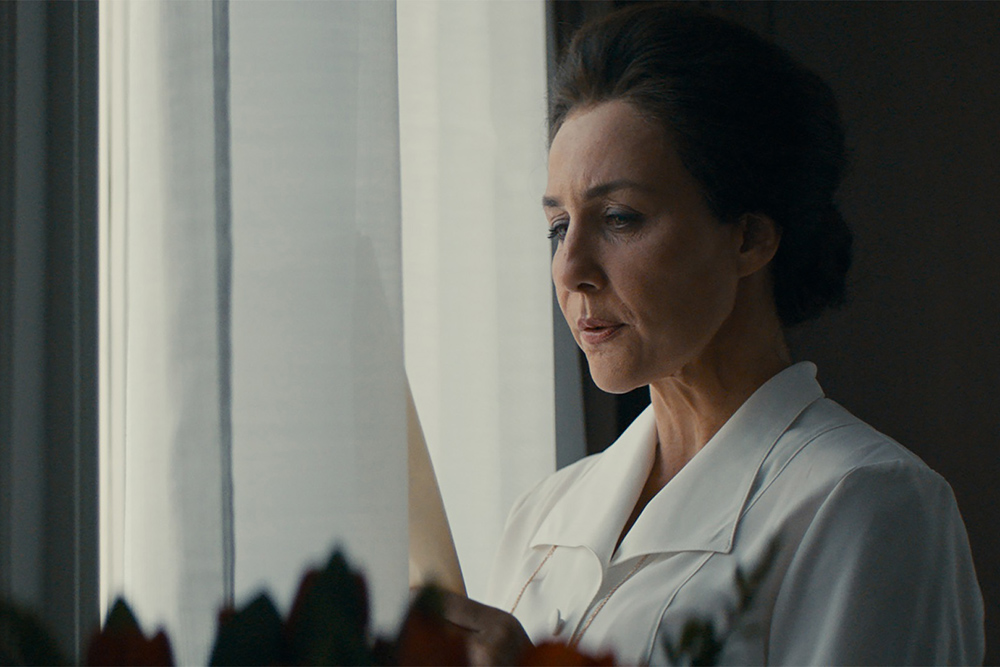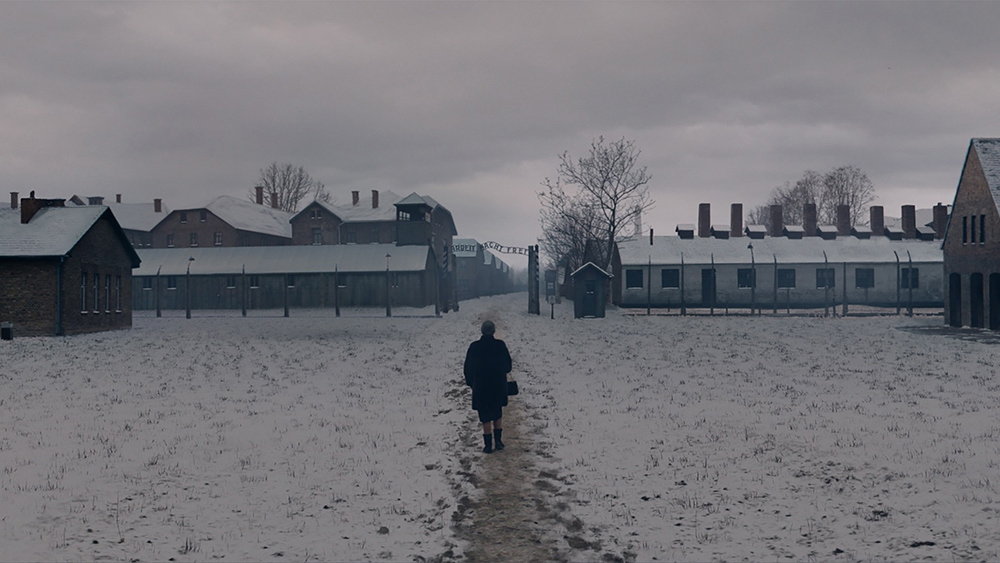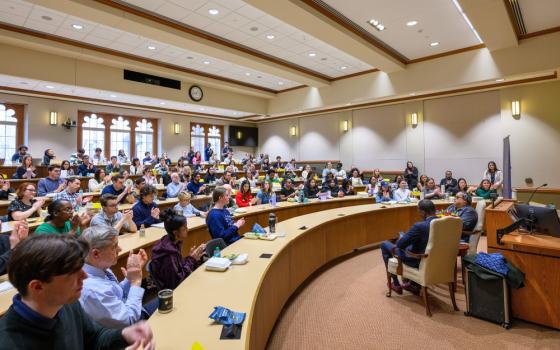
Elsa Zylberstein portrays French politician Simone Veil in "Simone: Woman of the Century" (Courtesy of Samuel Goldwyn Films)
In 2018, when Simone Veil was buried in the French Panthéon, a sacred edifice dedicated to St. Genevieve that houses the remains of France's most distinguished sons and daughters, she was laid to rest alongside figures like Voltaire, Jean-Jacques Rousseau, Victor Hugo, Émile Zola, Pierre Curie and Alexandre Dumas. Even in death, Veil was mostly surrounded by men.
Although her name might not be as easily recognizable as those of her fellow Panthéon companions (and might be confused for that of Simone Weil, the French mystic who died in 1943 when Veil was a teenager), through her work in politics and the defense of women's rights, she left an indelible mark not only in France but in all of Europe. Perhaps Veil's name will become better known through Olivier Dahan's newest biopic "Simone: Woman of the Century," which opens in U.S. theaters today.
Following Dahan's signature style (he previously directed "La Vie en Rose" and "Grace of Monaco"), the film travels back and forth in time as a mature Veil (Elsa Zylberstein) looks back on her life. Her achievements are on display as a young magistrate (played by Rebecca Marder) seeking prison reform, in local government as health minister under several administrations and as the first woman to hold office as the president of the European Parliament.
Interspersed between these remarkable achievements are the painful memories of personal tragedy and her experience as a Holocaust survivor. Veil lost most of her family at Auschwitz and Bergen-Belsen.
In some of his other films, Dahan hasn't always been successful in creating nuanced dichotomies between the pain and joy of his subjects, but in "Simone: Woman of the Century," we find the director attempting an exercise in discernment. Rather than suggest that it was Veil's extreme suffering that led her to pursue a life devoted to the service of others' well-being, Dahan observes his leading character as someone on the constant verge of a spiritual crisis: What is the purpose of serving others in a world that seems to inflict pain on the most vulnerable?

A scene from "Simone: Woman of the Century" (Courtesy of Samuel Goldwyn Films)
Veil was never outspoken about her own spiritual beliefs; she referred to her Judaism as something claimed by her father "for cultural, not religious reasons." But it's impossible not to draw parallels between her humanistic policies and the teachings of Jesus in the New Testament.
When she's confronted by prison wardens in Algiers for demanding that prisoners of war be treated like human beings, she clarifies she's not there to subject them to another trial but to vouch for their human dignity: "It's what counts here," she reminds them. When she crouches to wipe the sweat and blood off a 16-year-old prisoner's face, it becomes clear Veil carried a banner of compassion rather than a French flag.
Dahan frames these pivotal moments as contrasts: Who was she to refuse someone the kindnesses she had been refused in concentration camps?
Despite the constant attacks Veil receives from political opponents (Dahan shoots screaming men decrying Veil, looking at the camera, to emphasize the wall of violence always looming over her), she makes a point of pursuing collaborations with her Catholic colleagues, hoping they will see beyond the politics and, like her, pursue an end to cruel policies that put women and other marginalized people at disadvantage.
This is a film about God's timing, even when reasons remain a mystery.
Near the end of her life, Veil strived to change conditions for HIV-positive patients in French hospitals and to revise cruel policies aimed at people living with substance abuse and addiction. The love of God being manifested as works in action.
The impressionistic biopic completes a trilogy of sorts in which Dahan has focused on telling the stories of women who defined the 20th century — and who left indelible impressions — through the television camera. In 2007's "La Vie en Rose" Dahan recreated some of Edith Piaf's most legendary television interviews (winning Marion Cotillard an Oscar, BAFTA, César and Golden Globe for her work as the tragic chanteuse). In 2014, he directed Nicole Kidman as Princess Grace in "Grace of Monaco" and emulated both TV and film captures of the famous Philadelphian-turned-royal.
In the plentiful years between "Grace" and "Simone," Dahan did a medium-length film commissioned by controversial fashion designer John Galliano, which set his latest fashion line against an apocalyptic backdrop.
In "Simone," Dahan takes on the scenes set in concentration camps without any of the stylistic flair but with much of the spiritual pain oozing from the screen. The most heartbreaking moments in this biopic aren't those in which we see terrible things depicted (Dahan avoids sensationalism at every turn), but when we see the emotional effect they have on Veil.
Advertisement
The scene where she realizes her mother has died at the concentration camp is not marked by emotional music or grandiose dialogues. In fact, it's the fact that she wasn't able to say goodbye that leads Simone to collapse in the arms of her sister (Judith Chemla).
Rather than letting the camera linger on the sisters' pain, Dahan shows us earlier moments where the young Simone listens to her mom (a luminous Élodie Bouchez) tell her about the importance of Louise Weiss, a feminist icon whom an older Simone later meets at the European Parliament. This is a film about God's timing, even when reasons remain a mystery.
More than with any other of the heroines he's captured onscreen, Dahan has found a perfect avatar for the syndromes of the century in Veil. It helps that Zylberstein delivers a performance of quiet grace, acing Veil's mannerisms, intonation and walk while allowing herself to become an archetype where viewers can project their fears, dreams and hopes.
In a different timeline, perhaps Veil would have befriended Simone Weil and relied on her wisdom to fuel her fight for the less fortunate, like she did with Weiss. I didn't know of Weil until I did research on Veil when I first watched this film, and found peace in the realization of how the works of two women who never met were so aligned when it came to helping those on the margins and dreaming of a better world.
"Simone: Woman of the Century" reminded me of how we discover stories when we need them the most. "Simone" reminds us that another way is possible, and that we are never alone.








